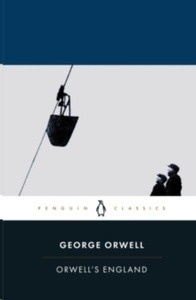Orwell's England

Editorial Penguin Books Ltd
Fecha de edición octubre 2020 · Edición nº 1
Idioma inglés
EAN 9780241418024
496 páginas
Libro
encuadernado en tapa blanda
Dimensiones 198 mm x 129 mm
Resumen del libro
Much of George Orwell's best writing, brought together in this comprehensive collection, is concerned with England, a country that he found both endearing and frustrating. In the brilliantly perceptive The English People, he lists the national characteristics as 'suspicion of foreigners, sentimentality about animals, hypocrisy, exaggerated class distinctions, and an obsession with sport'. The Road to Wigan Pier, his blistering account of poverty in the north of England, and his essays on class and the horrors of life at private school violently attack what he famously called 'the most class-ridden country under the sun'. Yet other writings here also ruminate on the merits of cricket, gardening, roast dinners, pubs, cups of tea and seaside postcards, showing Orwell's attitude to Englishness in all its lively complexity.
Biografía del autor
Fue en 1903 cuando Eric Arthur Blair, el escritor británico más conocido por su seudónimo George Orwell, nació en Motihari, India. Estudió en el Eton College de Inglaterra gracias a una beca, y prestó sus servicios en la Policía Imperial. Estuvo destinado en Birmania, de 1922 a 1927, fecha en que regresó a Inglaterra. Enfermo y luchando por abrirse camino como escritor, vivió durante varios años en la pobreza, primero en París y más tarde en Londres. Como resultado de esta experiencia escribió un primer libro 'Sin blanca en París y Londres' (1933), donde relata las sórdidas condiciones de vida de las gentes sin hogar. 'Días en Birmania' (1934), un feroz ataque contra el imperialismo, es también, en gran medida, una obra autobiográfica. Su siguiente novela, 'La hija del Reverendo' (1935), cuenta la historia de una solterona infeliz que encuentra de manera efímera su liberación viviendo entre los campesinos. En 1936 Orwell luchó en el ejército republicano durante la Guerra Civil española (1936-1939). El autor describe su experiencia bélica en 'Homenaje a Catalunya' (1938), uno de los relatos más conmovedores escritos sobre esta guerra y en el que se hace responsable al Partido Comunista Español (PCE) y a la Unión Soviética de la destrucción del anarquismo español que supuso el triunfo de la Falange. 'El camino a Wigan Pier' (1937), escrita en esta misma época, es una crónica desgarradora sobre la vida de los mineros sin trabajo en el norte de Inglaterra. Su condena de la sociedad totalitaria queda brillantemente plasmada en una ingeniosa fábula de carácter alegórico, 'Rebelión en la granja' (1945), basada en la traición de Stalin a la Revolución Rusa, así como en la novela satírica '1984' (1949). Esta última ofrece una descripción aterradora de la vida bajo la vigilancia constante del "Gran Hermano". Cabe citar entre otros escritos, la novela 'Que vuele la aspidistra' (1936) y 'Disparando al elefante y otros ensayos' (1950), ambas consideradas modelos de prosa descriptiva, y 'Así fueron las alegrías' (1953), un recuerdo de sus difíciles años de estudiante. En 1968 se publicaron en cuatro volúmenes sus Ensayos Completos: Periodismo y Cartas. Orwell murió de tuberculosis en enero de 1950, dejando tras de sí un profundo escepticismo por las marañas políticas








